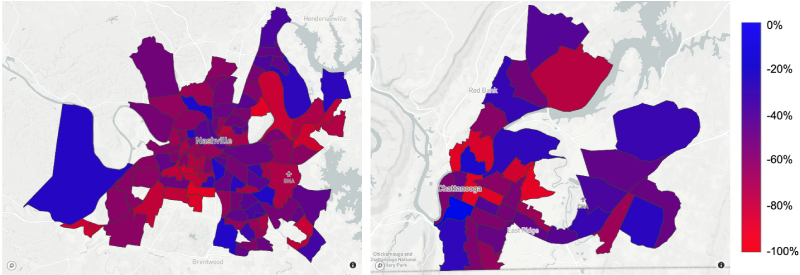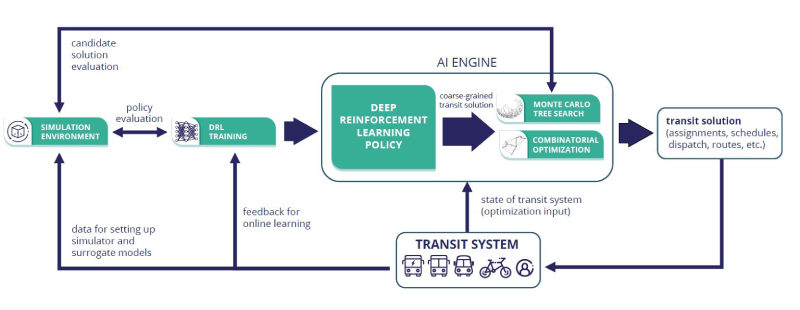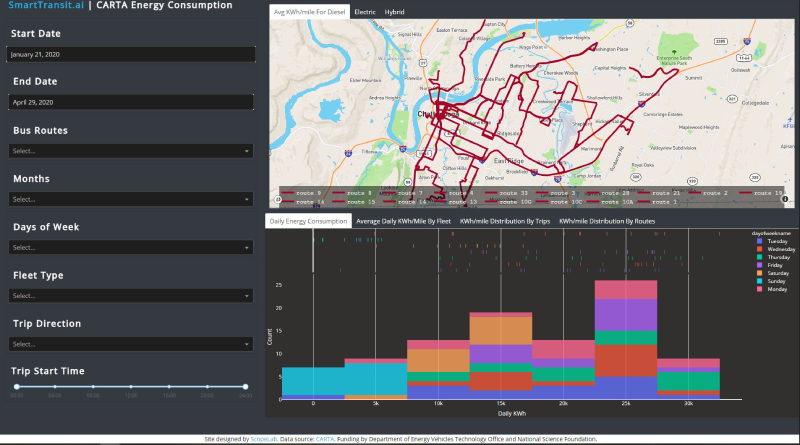A $2.1 million grant from the National Science Foundation and a $1.8 million grant from the U.S. Department of Energy will provide funding for Vanderbilt researcher Abhishek Dubey, assistant professor of electrical engineering and computer science, to reimagine regional transit systems using cutting-edge data science techniques through a group of projects called Smart Transit.

Both grants will fund projects with the Chattanooga Area Regional Transportation Authority and will be led by Dubey’s Smart and resilient Computing for Physical Environments Lab within Vanderbilt’s Institute for Software Integrated Systems.
Dubey’s NSF project, “Mobility for all: Harnessing emerging transit solutions for underserved communities,” will focus on developing technology to design micro-transit systems to serve areas where fixed line transit is not economical. The system would dynamically generate routes that more easily enable passengers to access service from stops based on rider demand, similar to ride sharing shuttle or pool service. In addition, the grants provide funding for community engagement efforts to understand key challenges and communicate new solutions in service adoption.

In the past technology to establish integrated micro-transit systems has not been successful because the system-level challenges are too technically difficult to handle and confusion among passengers leads to limited adoption. To account for these known challenges, the project will take a socio-relational approach through the input of Paul Speer, professor and chair of the Department of Human and Organizational Development at Peabody College and an expert in community organizing, social power and community change. His expertise will aid in the project’s community engagement efforts.
Others involved in Dubey’s NSF grant include:
- Aron Laszka, a cybersecurity expert and assistant professor of computer science at the University of Houston
- Lillian Ratliff, an active-learning expert and assistant professor of electrical engineering at the University of Washington
- Samitha Samaranayake, a route planning and dispatch expert and assistant professor in civil and environmental engineering at Cornell
- Chandra Ward, an urban sociology expert and assistant professor of sociology at the University of Tennessee Chattanooga
- Mina Sartipi, the director of the Center for Urban Informatics and Progress at the University of Tennessee Chattanooga.
“We are applying community process best practices to achieve broad support for a tech-enabled transit system in Chattanooga,” said Speer. “We intend to connect with community leaders who can then engage their constituents, so that we have a clear understanding of peoples’ mobility needs. With this information, Prof. Dubey and our collaborators can design a truly smart transit system.” The Department of Energy project, “AI: Engine for optimizing integrated service in mixed fleet transit operations,” seeks to develop more energy efficient solutions to combine individualized transit for people with disabilities with fixed-route service.

Dubey and his collaborators will use state-of-the-art machine learning and data driven optimization techniques to handle the logistics challenges of integrating 21st century transit’s opposing goals – keeping on schedule amid traffic and accommodating dynamic stops – while ensuring that the service meets strict requirements
Dubey plans to explore methods that draw upon reinforcement learning and Multiagent Monte Carlo search methods, an application of artificial intelligence that can forecast outcomes based on decision-making factors. For example, if there are two requests made at once, the Monte Carlo search method will run through multiple scenarios until it determines the ‘best’ solution to accommodate both. Dubey has applied these methods in the past to optimize the operations for ambulances.
A key aspect of both projects will be the ability to design and configure complex artificial intelligence algorithms that improve over time and learn with new scenarios and situations. To do so, the team is building a large integrated simulation of Chattanooga’s transit system. “We will be questioning how to set the parameters that will lead CARTA to the best performance across its operations, refining our techniques,” Dubey said. “This is a complex, multidimensional process that our group is looking forward to applying to a real-world challenge. When we solve this, we’ll have helped create a more energy efficient and effective public transit system.” Dubey’s models have already resulted in a data dashboard that demonstrates the efficiency advantages of specific routes based on travel routes and timing.

“We have some very interesting challenges to solve, particularly as we’re doing this work amid a global pandemic,” said Dubey, who is also a senior research scientist at Vanderbilt’s Institute for Software Integrated Systems. “Our goal with these synergistic projects is to rethink entirely the on-demand and fixed-line transit operations to make them more efficient and user friendly for passengers over the next four years.”
The DOE grant complements Dubey’s prior energy efficiency project already underway with CARTA.